
Lymphoma is a cancer that starts in the lymphatic system, which plays a vital role in your immune defence. It occurs when lymphocytes—a type of white blood cell—grow uncontrollably.
Synopsis
Two main types of Lymphoma
1. Hodgkin Lymphoma (HL):
Marked by the presence of Reed-Sternberg cells on microscopic examination, it typically presents with swollen lymph nodes, fever, and fatigue. It's relatively rare and highly treatable, especially in early stages.
2. Non-Hodgkin Lymphoma (NHL):
A more diverse group of blood cancers, NHL varies in aggressiveness and symptoms depending on its subtype, affecting people across all age groups.
Early Signs: Listen to Your Body
Recognising the early symptoms of lymphoma can be life-saving. Many of them are subtle, making it easy to overlook them.
|
Symptom |
What to Watch For |
|
Swollen Lymph Nodes |
Painless lumps in the neck, armpits, or groin that don’t subside |
|
Persistent Fatigue |
Ongoing exhaustion that rest doesn’t fix |
|
Intense, drenching sweats, especially during sleep |
|
|
Unexplained Weight Loss |
Losing >10% of body weight in 6 months |
|
Persistent itching, often without a visible rash |
When to Seek Medical Help
Don't delay. If you're experiencing unexplained fatigue, enlarged lymph nodes, or consistent weight loss, it's time to consult a doctor. The earlier the lymphoma is detected, the better your chances for a cure.
Red flags to look out for:
-
Lumps that persist or grow
-
Recurrent fevers or chills
-
Unexplained fatigue
-
Persistent itching or new skin rashes

How Is Lymphoma Diagnosed?
A thorough workup helps confirm the diagnosis and guide treatment:
-
Physical Exam & History
-
Blood Tests – Look for abnormalities and rule out infections
-
Imaging – CT, PET, or MRI scans detect the spread
-
Biopsy – Confirms lymphoma through tissue sampling
-
Advanced Testing – Immunohistochemistry (IHC) and molecular profiling help identify precise subtypes and guide personalised treatment
Treatment Options: From Conventional to Cutting-Edge
Your treatment journey will depend on the type and stage of lymphoma:
-
Chemotherapy: A cornerstone treatment that kills fast-growing cancer cells, often used alone or in combination.
-
Targeted Therapy: Drugs that precisely attack cancer cells while sparing healthy ones, improving efficacy and tolerability.
-
Radiation Therapy: Focused energy beams to destroy cancer cells in specific lymph node regions.
-
Bone Marrow Transplant (BMT): After high-dose chemotherapy, healthy stem cells—either your own or from a donor—are infused to restore bone marrow. This option offers hope for long-term remission, especially in relapsed cases.
-
CART-CellTherapy: A breakthrough in lymphoma care. A patient’s T-cells are genetically modified to fight cancer directly. After preparation, these “supercharged” immune cells are reinfused to hunt and destroy lymphoma cells. This is especially effective in patients whose disease hasn't responded to standard therapies.
Life After Lymphoma
Living with or beyond lymphoma means embracing both recovery and vigilance.
-
Hope is real: Many patients achieve long-term remission—even with advanced disease.
-
Support matters: Counselling, support groups, yoga, and good nutrition all help manage the physical and emotional journey.
-
Unique challenges: Young adults may face fertility issues, academic or career interruptions, but with the right care, life can resume meaningfully.
-
Follow-up is key: Regular checkups are essential for monitoring remission and catching any recurrence early.
What Causes Lymphoma?
While causes aren't always clear, certain risk factors are known:
-
Weakened immune system (e.g., HIV, post-transplant)
-
Autoimmune diseases
-
Exposure to certain chemicals or radiation
-
Family history
-
Viral infections (e.g., Epstein-Barr Virus)
Not everyone with these risk factors develops lymphoma, but knowing them can lead to smarter, earlier health choices.
Conclusion: Stay Alert, Stay Ahead
Lymphoma doesn’t always shout—it whispers. By tuning into your body and seeking timely help, you empower yourself and your loved ones.
Lymphoma is treatable. Cure is possible. And early action changes everything.
If you're concerned about symptoms or need expert care, connect with the Medical Hemato-Oncology specialists at Manipal Hospitals, Dwarka. We’re here with advanced diagnostics, personalized treatments, and compassionate support.
Book your consultation today. Your health deserves your attention.
FAQ's
Yes, it affects lymphocytes—key players in the immune system—and is considered a blood cancer.
Swollen lymph nodes, fatigue, night sweats, weight loss, and itching are key early indicators.
HL has distinct Reed-Sternberg cells and typically a better prognosis; NHL includes many subtypes with variable behaviour.
Via blood tests, imaging, lymph node biopsy, and specialised molecular/IHC testing.
Yes, especially when caught early. Even in advanced cases, modern treatments offer high chances of remission and long-term control.





















 4 Min Read
4 Min Read


















